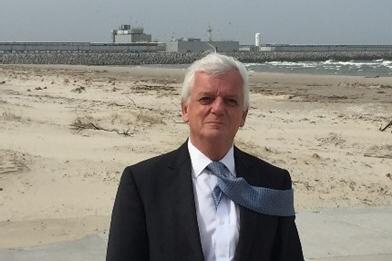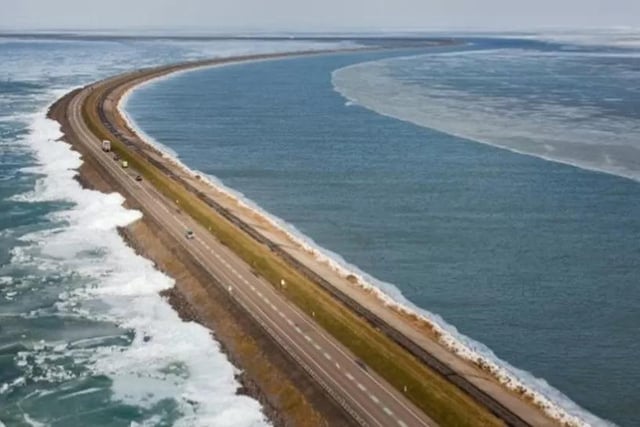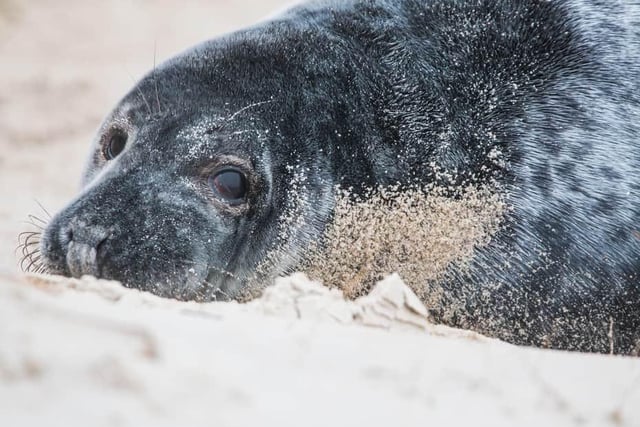James Sutcliffe’s mindblowing project – creating a port in Skegness that “would support Britain’s export industry” and link Gibraltar Point with Hunstanton with a Florda Keys style highway – has already prompted talks in Norfolk, the most recent public meeting being held earlier this month.
However, the sheer size of what is beng proposed, which Mr Sutcliffe would cost hundreds of millions of pounds” has raised concerns from environmentalists.
The company of which Mr Sutcliffe is Chief Executive, Centre Port, says the project will boost the economy and produce huge amounts of renewable energy supplying 600,000 homes.
The container port could create 1,200 jobs and there would also be a railway line and hydroelectric power plant featuring about 40 turbines to generate electricity from the tidal flow, Centre Port claims.
For tourism, the 11-mile long highway it would cut the current 70-mile journey from Skegness to Hunstanton.
In response to the recent public meeting at Hunstanton's Princess Theatre, a joint statement on the Lincolnshire Wildlife Trust website from Norfolk and Lincolnshire Wildlife Trusts, alongside partners Wildfowl & Wetlands Trust, RSPB and Wild Ken Hill addresses the concerns of environmentalists in both counties.
The statement refers to the container terminal as a “tidal barrage” and claims it “would release vast quantities of carbon into the atmosphere, exacerbating the impacts of climate change”.
The local £3.5million fishing industry around Boston and King’s Lynn would also be affected by the opening of a new deep-water port, it states.
Gareth Dalglish, Norfolk Wildlife Trust's Nature Recovery Director, said “The obvious lack of concern for this delicate wild landscape, and its importance on a local, national and global scale for people and wildlife is deeply concerning.
"And it won’t just reduce carbon storage - it will exacerbate the issue due to significant carbon emissions linked to the development and management of the barrage and its associated infrastructure.
“The sediments which accumulate in The Wash store 11,000 tonnes of carbon every year. If a barrage is built, this sediment supply into The Wash from the North Sea will be stopped."
These concerns reflect the importance of The Wash as recognised in national and international environmental designations, including Site of Special Scientific Interest (SSSI), Special Area of Conservation (SAC) and Special Protection Area (SPA). The area – including RSPB Freiston Shore, RSPB Frampton Marsh, Gibraltar Point, Sandilands, Saltfleetby-Theddlethorpe , Chapel Pit and Huttoft Bank Pit. – has also recently been added to a list of areas in consideration for UNESCO World Heritage Site status.
There has also been much focus from Lincolnshire County Council in developing these coastal wildlife park sites and tha coastal path that passes through them was recently renamed the King’s Path, with His Majesty King Charles 11 visiting Lincolnshire Wildlife Trust at the Saltfleetby-Theddlethorpe Dunes National Nature Reserve.shortly after his coronation.
However, Mr Sutcliffe reassured Lincolnshire World he is fully aware of the need to protect the coast and its natural habitats from climate change.
"I want the public and environmentalists to know I am on their side,” he said. “Climate change is not going away as we have seen with the recent flooding in the county.
"There will be no future for the nature along the Lincolnshire coast if it is two foot under water.”
Mr Sutcliffe says he knows the Wash having been responsible for the privatisation of the Port of Boston 1990, modernising it and doubling its value by creating a new 300,000 ton capacity rail connected steel terminal and 350,000 ton paper import/ distribution facility before he sold it in1999.
"The first thing to point out is the project is not a barrage or barrier as has been reported,” he said.
"The turbines generating electricity do not affect tidal flow and will move so slowly fish can swim freely through it – they do not come out the other side as cat food.
"However, if there is notification of a tidal surge we can close off the turbines creating a barrier to protect the coastline from flooding."
So far there have been no public meetings in Lincolnshire, which Mr Sutcliffe says he would welcome.
"Lincolnshire stands to be county that would most benefit from this development,” he said. “ I appreciate there are concerns but there will be environmental studies and the project will not happen unless they are supportive.
"The positives are immense and especially for Lincolnshire with creation of jobs, boost for tourism and the possibility of cruise ships being able to use the terminal and the potential of rail freight capacity improvements from Wainfleet Station.
"We already have investors showing a real interest in backing the project and intested in businesses in the Midlands using the terminal as it would cut their carbon footprint travelling to ports in the south.
"This is a real opportunity for Lincolnshire.”
Lincolnshire World asked Lincolnshire County Council for its views on the project.
Coun Colin Davie, executive member for environment at Lincolnshire County Council, told Lincolnshire World: “Our position on this project has not changed: we are awaiting details from Centre Port about how a Wash barrage would overcome the numerous challenges that a project of this scale would face.
"Not least how it will preserve the unique ecology of the Wash, and how this project might affect our communities and businesses on the Lincolnshire coast.”

1. Centre Port
James Sutcliffe, Chief Executive, Centre Port, Photo: Submitted

2. Centre Port
An artist's impression of the carrageway in The Wash between Lincolnshire and Norfolk. Photo: Centre Port. Photo: Centre Port

3. Centre Port
Lincolnshire Wildlife Trust are amongst those concerned about the proposals. Photo: Lincolnshire Wildlife Trust

4. Centre Port
A seal at Donna Nook where each year thoudands of people visit to see the pups that are born there. Photo: Lincolnshire Wildlife Trust

